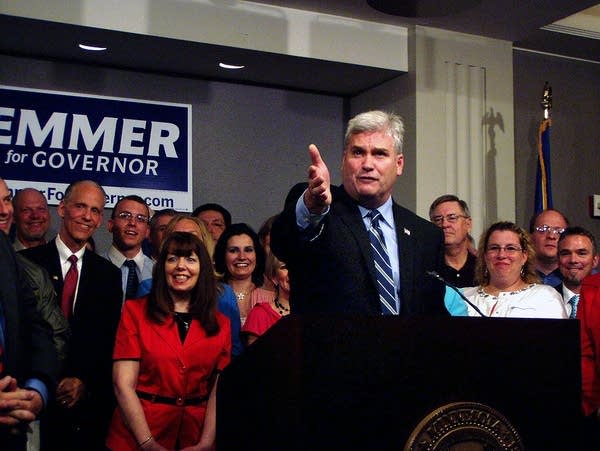A closer look at Tom Emmer's plan to cut state agencies

Republican gubernatorial candidate Tom Emmer says he wants to dramatically redesign and reform state government, but has yet to release the specifics of his budget plan.
Emmer has made some pretty bold statements on how to deal with the state's budget deficit.
In late April, he suggested he could eliminate a third of overall state spending, roughly $20 billion. Last month, Emmer told Minnesota Public Radio News that he would cut or merge several large state government departments.
"We will go and look at all of the duplication and excess in government," Emmer said. "You could look at some 26 agencies and reduce them down to 12."
Create a More Connected Minnesota
MPR News is your trusted resource for the news you need. With your support, MPR News brings accessible, courageous journalism and authentic conversation to everyone - free of paywalls and barriers. Your gift makes a difference.
Emmer has yet to detail the departments or agencies he would eliminate, and has repeatedly declined to provide specifics on how he'll balance the state's budget. Instead, he said he's embarking on a listening tour to gather input from the public.
"You've got to hear what we've been saying," he said. "And what we've been saying is that before we start telling you what we know needs to be done, we're traveling this state and we're listening."
But Emmer has been doing some research. In October 2009, he sent a request on Minnesota House letterhead to every state agency asking for budget details, job descriptions and organization charts. And during the last 11 months on the campaign trail, Emmer has given hints about which agencies are on his hit list.

At various times in recent months, Emmer has called for eliminating agencies, merging departments and looking at duplication in government.
"The Department of Human Rights needs to go away," Emmer said during a debate. "I'm not combining it with anything. You talk about redesigning a smaller Met Council. The Met Council needs to go away."
Emmer has talked about combining the Department of Corrections with the Department of Public Safety, as well as the Department of Health with the Department of Human Services, saying: "God forbid, you would have a Department of Corrections and a Department of Public Safety as one."
During news conferences he's talked about duplication as well.
"It doesn't take a rocket scientist to sit down and say, wait a second. We have four agencies that all deal with water? You know, you can start doing it yourself," he said. "You can sit down and start looking for all of the duplication across agencies."
Eliminating the five agencies suggested by Emmer would cut less than 4 percent of the state's projected $5.8 billion deficit in the next budget cycle.
Emmer has specifically said he wants to eliminate five agencies -- the Department of Human Rights, the Bureau of Mediation Services, the Housing Finance Agency, the Office of Enterprise Technology and the Metropolitan Council.
Eliminating those agencies would cut $232 million in state spending -- just 4 percent of the state's projected $5.8 billion budget deficit in the next budget cycle.
Emmer has said combining and cutting those agencies will make government more efficient, but his statements don't always square with the actual work being done in the departments.
During a debate in March, Emmer said the state could save a lot of money if the Minnesota Housing Finance Agency were eliminated.
"If you get rid of the Minnesota Housing Finance Agency, ladies and gentlemen, and move it to a rent subsidies thing, that's a $1.6 billion item," he said.
But that calculcation is wrong, according to Tim Marx, who ran the Housing Finance Agency under Gov. Tim Pawlenty from 2003-2008. Marx said less than 10 percent of the agency's budget comes from state tax dollars. The other funds come from selling bonds to the private market, the federal government, or from borrowing money at one rate and lending it at another.
Marx said the agency doesn't use state money to employ staff or rent office space. Instead, the $84 million in state taxpayer funds spent on the agency is dedicated to affordable housing.
"The agency is self-supporting, and the appropriations that the agency receives do not go to the operations of the agency," Marx said.
Emmer also said he doesn't understand why the state is involved in using public money to compete with private businesses. But Marx and Jim Solem, who ran the agency from 1978-1994, said the Housing Finance Agency's mission is to provide housing help to those who can't get it from the private market.

Solem also said the state would be faced with multiple lawsuits if the agency were completely shut down.
"The agency has pledged to those bond holders and folks who have invested in Minnesota that it will be a good steward of their money, and will actively work to make certain they get repaid," Solem said. "So the agency has to be in business for as long as those bonds are outstanding, or the bond holders would sue the state of Minnesota and probably win."
Housing Finance isn't Emmer's only target. He typically brings up the Minnesota Department of Human Rights when he talks about government duplication.
"You don't need the Department of Human Rights," Emmer said. "It's not because we're opposed to human rights; I think it's a very important issue. We should always recognize that, but we have an EEOC that does essentially the same thing."
Velma Korbel, who was Commissioner of the Minnesota Department of Human Rights from 2003 until last month, said Emmer's suggestion that the Equal Employment Opportunity Commission -- a federal agency -- does the same work as the Human Rights Department is wrong.
"If you don't have a charge that falls within the jurisdiction within the EEOC, and the Human Rights Department goes away, you don't have a place to file a charge," Korbel said.
She said the EEOC's role is much narrower than the state's human rights law.
"The EEOC doesn't look at housing complaints. The EEOC doesn't look at complaints filed on the basis of education," she said. "They don't look at charges filed in public accommodations or public services, and they don't look at charges dealing with business and credit."
Emmer also said he thinks he could cut total government spending by $20 billion, but to do that he would have to do more than cut a few government agencies. The state spends 85 percent of its budget on K-12 schools, higher education, social service programs and aid to local governments.
Jeff Zlonis of Public Strategies Group, a company that advises governments on how to be more efficient, said it's good to want to make government work better, but cutting agencies isn't always the solution.
"To just say that by moving boxes, we're going to save money, doesn't cut it," Zlonis said. "It doesn't work. People have tried it. You end up with organizations that are probably more bureaucratic, because you have more levels when you collapse organizations and put them together. Quite often you end up with more levels of bureaucracy, not less."
Zlonis is right that merging or cutting departments doesn't always save a lot of money. In 2008, Minnesota eliminated the Department of Employee Relations and merged its functions with other departments.
Total savings for the taxpayers: $139,000.
